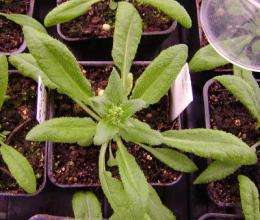Biochemists to study how crops can increase protein production

The small flowering plant Arabidopsis is widely used in laboratories as a model organism in plant biology.
A member of the mustard family, Arabidopsis offers researchers several advantages such as a completely sequenced genome, a compact size, a life-cycle of about only six weeks from seed to seed, easy cultivation and high seed production.
Now Daniel Gallie, a professor of biochemistry at UC Riverside, has received a three-year grant of nearly $1.75 million from the National Science Foundation to study how each Arabidopsis gene is converted into protein and how plants control this process.
The research can help improve protein production in crops. Protein-rich crops improve the diet of humans directly and promote livestock productivity for a growing world population. Besides their nutritional advantages, these crops also reduce the environmental impact of livestock production by potentially reducing the acreage required for agriculture.
"Understanding how most genes, out of the more than 25,000 genes in Arabidopsis, are converted into protein will be important in understanding how plants control protein synthesis," Gallie said. "This knowledge is essential in improving protein production in crops."
With the advent of the complete sequence of the genome of Arabidopsis and other plant species, researchers are now in a position of being able to understand how every gene in an organism is converted into protein.
"This, in conjunction with the development of other recent technologies, such as the ability to identify mutants in most genes as well as to analyze virtually all genes in Arabidopsis on a chip no larger than a fingertip, makes such a study possible for the first time," Gallie said.
He explained that the process of protein production involves many steps and requires multiple factors to carry out the synthesis.
"Our approach will identify which steps and which factors are involved for every gene," he said.
Gallie is the principal investigator of the National Science Foundation grant. UCR will manage the multi-investigator project that also involves researchers at three other universities: The University of Texas at Austin; the University of Tennessee, Knoxville; and the University of Arizona.
UCR has received $569,681 from the National Science Foundation for the first year of Gallie's research project. Funding in subsequent years ($581,775 in 2010 and $592,854 in 2011) is contingent on the availability of funds and scientific progress.
A portion of the grant will support graduate students and postdoctoral researchers in Gallie's lab.
Source: University of California - Riverside



















